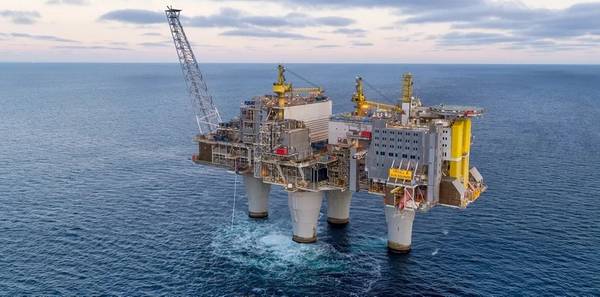
In 2024, Equinor’s Troll field in the North Sea produced more gas than ever before, while significantly reducing CO2 emissions.
The Troll field in the North Sea has set a historic production record, delivering 42.5 billion standard cubic metres of natural gas in 2024.
This is the highest annual production ever for the field, and is an increase of almost 10% from the previous record from 2022 (38.8 billion standard cubic metres).
"With record-high production in 2024, the Troll field confirms its position as a pillar of Europe's energy security. The field contributes to a stable gas supply for millions of households and is important for European industry.
“This milestone is the result of decades of targeted work to recover the Troll oil and gas resources in an efficient and sustainable manner. It is rewarding to be able to deliver such significant volumes of gas when Europe needs it most," said Kjetil Hove, Equinor's executive vice president for Exploration & Production Norway.
Troll A and the processing plant at Kollsnes have been electrified since the start-up in 1996. Gas on the Norwegian continental shelf (NCS) is locally sourced and has the industry's lowest emissions from production and transport.
This year's record is the result of high regularity, a year without turnarounds, as well as upgrades that have increased efficiency, according Equinor.
Riser replacement on Troll B has also played an important role in maximizing production.
Since coming on stream in 1996, the Troll A platform has been the main contributor to natural gas production on the NCS. In 2021, production was expanded to also include the gas cap in the western part of the reservoir, facilitated by a major subsea development.
This expansion has been instrumental in increasing production, even 28 years after the start-up. The Troll B and C platforms also contribute significant quantities of gas that are transported via Troll A to Kollsnes.
During 2024, both the Troll B and C platforms were partially electrified. This enabled significant CO2 emission cuts for 2024. A preliminary estimate indicates that emissions have been reduced by approximately 90,000 tonnes in 2024, or approximately 15 percent in 2024.
During 2024, both the Troll B and C platforms were partially electrified. This enabled significant CO2 emission cuts for 2024. A preliminary estimate indicates that emissions have been reduced by approximately 90,000 tonnes in 2024, or approximately 15 percent in 2024.
In addition, the gas processing plant at Kollsnes has undergone significant upgrades in recent years. Working closely with the operator Gassco, capacity has been increased from 144.5 million to 156 million standard cubic metres per day. The upgrades proved to be an important contribution to the production record.
"The efforts to recover more Troll gas and increased export capacity clearly help ensure that our customers in Europe get the energy security and long-term perspective they need," added Helge Haugane, Equinor's senior vice president for gas and power trading.
Troll field licensees are Equinor, Petoro, Norske Shell, TotalEnergies and ConocoPhillips.